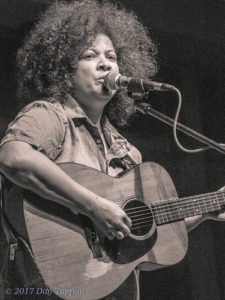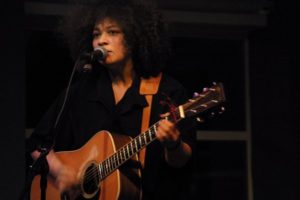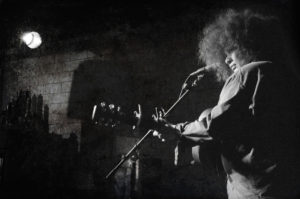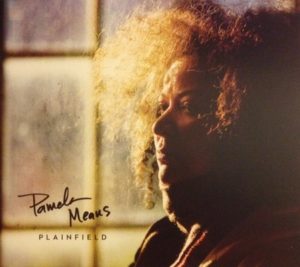
Pamela Means; photo Dan Tappan Photography
Pamela Means has the means to be great. The Northampton, Massachusetts-based singer-songwriter began her career in her hometown of Milwaukee, Wisconsin where there are very few solo acoustic performers, especially women or biracial women solo acoustic artists. Some promoters back in the day brought big acts into Milwaukee, and Means fit in easily as an opening act. One person, solo acoustic, be done. She opened for Neil Young and the Violent Femmes among many other national acts.
After making a name for herself locally in her home city, home state, and also on the national touring circuit, Means relocated to Boston. “I was pretty naïve. I didn’t know how big the world was. I didn’t know how to make a career.“
“Milwaukee,” she continued, “is a hyper-segregated city and it’s a terribly difficult place to live for any person of color, as well as for any people in the LGBTQ community, and I am all of those things.”
Means’s good friend Peter Mulvey, who had previously made the pilgrimage from Milwaukee to Boston before settling in the Hub, encouraged her to visit Cambridge-Somerville. He drove her from Logan Airport directly to a local open mic.
“In addition to the wealth of musical opportunities, I saw there, for the first time in my life, queer couples walking hand in hand, and not in the shadows but right down on Massachusetts Avenue in Cambridge. Out and proud.”
Six months later she moved to Boston. Her second album released after making her move was called Cobblestones, the title a reverence to her new city.
“That was after being in Boston for a couple of years and getting my name around and building a little momentum,” she said. “All those things came together at that time. Cobblestones is special to me because it was the first time I produced myself. That meant I wasn’t going to have other people tell me how it should go. I’m going to do it live in the studio and if that’s trouble for you, too bad. Figure it out.”:
Cobblestones was mostly a batch of political songs, personal politics rather than national. It was well received by fans and critics alike, gaining her even greater recognition in her new adopted city.
“It was a good album,” she said. “I’m different from a lot of my peers in that I was political at all. It was probably also race might have something to do with it. There’s very few people of color in the folk world, sadly, especially in Boston.”
A decade later, during the 2000s, Means went back on the road, touring the U.S. as a solo artist, playing lots of folk festivals. A week before the Clearwater Festival she got a call informing her that Pete Seeger needed a band. Means, together with a duo named Magpie, and Seeger’s grandson’s pal, became, for that a few other gigs, part of the legendary folk singer-songwriter’s band.

Pamela Means; photo: Julian Parker-Burns
“I was already booked for Clearwater Folk Festival that summer(2008), and I got a phone call saying Pete needs a band. Can you learn some songs.”
Aside from being steeped in folk and singer-songwriter idioms, Means has a solid background in jazz. She had studied classical guitar at the Wisconsin Conservatory. While there, she began a fascination with jazz. But, she dropped all of her jazz studies when she became a singer-songwriter playing her own songs throughout Milwaukee. Besides, at that time, she was not a good classroom student of jazz.
“I was terrible at jazz. It was really hard and my head didn’t get it,” Means said. “I didn’t listen to jazz until after I put Cobblestones out. It clicked how incredible and how incredibly disciplined every jazz musician is, and I wanted to be like that. So, I dug out my old homework, started to teach myself things that went over my head the first time. It evolved into my own jazz quartet, and I would like to be as busy with jazz gigs as I have been with folk singer gigs. I have a jazz album up my sleeve to release when I get a chance. It’s my second one. It’s solo acoustic. I started recording it before I started playing with these quartet fellows.”
Mean has, at a couple of special Abbey Road 50th anniversary events, played and sang the entire Beatles album. Opening song “Come Together” was the only one for which she used a pick. The rest of the album she finger picked to recreate many of the melodies and groove that make it Abbey Road.
“I can’t do everything that happens and that was part of the challenge,” she said. “The challenge was to figure out how can I do this as one person and still sound like me but still play the parts that are signature that the world knows of that album.”
Another Means project, too, gets special notice. She’s known especially for one of her eight recordings, the hard charging Single Bullet Theory. Released in 2003, the album focuses on George W. Bush, September 11, and the Patriot Act as well as on some personal journeys. Her song “Augusta” opens the CD.
“I spent the night in Augusta, Maine after doing a house concert,” she said. “It was just one of the first queer, gay love songs where I didn’t shy away from some language about it.”

Pamela Means; photo: Andi Roberts
Means also included on Single Bullet Theory her rendition of Billie Holiday’s “Strange Fruit.” The infamous recording had been black listed and it had faced other forms of censorship and retaliation because it looks white America in the face and describes black men hanging from trees after they had been publicly lynched. Means found it challenging to take on the song already made immortal by Holiday which has since been recorded by many more singers. The song had been named Time Magazine’s Song Of The Century.
A personal friend of Means’s back in Milwaukee kept pushing her to learn the number and record it.
“(He) said ‘every generation needs to know this song’ and I would say ‘well Billie Holiday sang it. I can’t sing it. Billie holiday already did it.’ He kept pushing it. He gave me books about the song, and there’s a PBS documentary about it. I learned that dozens of artists recoded it and some of them lost their careers.”
“Josh White was a folk singer in New York,” Means continued.. “Musicians had to have cabaret licenses to play where alcohol was served back in those days. He lost his license because he refused to stop singing ’Strange Fruit.’ Then I learned that back story and that scores of musicians had sung it, then I thought OK, I’ll try to learn it.”
Means had also visited Milwaukee’s now defunct America’s Black Holocaust Museum where the founder, James Cameron, had told her that he was the only known survivor of a lynching in the United States. “He told a (nationally known) story where he was nearly lynched when he was 14 in 1930 in Indiana. Two of his friend were (lynched.)”
Means got back to her political songwriting with her 2016 release, Plainfield, her eighth album, named for the western Massachusetts town she was living in during a dark period in her life. She focuses her themes on Plainfield, as on other albums, mostly on racial issues. Why does a bi-racial gay woman focus on civil right more so than on issues facing the LBGT community?
 “I think because it was the first thing that made me feel pain or persecuted, was the first thing that was pointed out about me was race,” she said. “And of all things that I am, bi-racial, queer woman. In fact, I’ve had these conversations in recent weeks since the protests that race is still always the first thing to give me any kind of hassle, no matter what zip code I’m in. I think that’s why it comes up in my songwriting. Although, as a queer person, I started to not shy away from gender pronouns in my songwriting to come out about that part. So far, my queer songs are more celebratory. I guess that’s where I am at this moment.”
“I think because it was the first thing that made me feel pain or persecuted, was the first thing that was pointed out about me was race,” she said. “And of all things that I am, bi-racial, queer woman. In fact, I’ve had these conversations in recent weeks since the protests that race is still always the first thing to give me any kind of hassle, no matter what zip code I’m in. I think that’s why it comes up in my songwriting. Although, as a queer person, I started to not shy away from gender pronouns in my songwriting to come out about that part. So far, my queer songs are more celebratory. I guess that’s where I am at this moment.”
“Queer woman” is a term Means embraces. “Or, lesbian. I don’t shy away from that. It took me a long time to say that word. I’m gay, lesbian, queer.” She said it is more likely than not she will eventually write about her experiences as a gay woman but currently she thinks in terms of “look at what is happening in our country right now.”
Means’s next step in her career is to tour ,if the world ever opens up again. She has a band with two other women called Pamela Means And The Reparations. A return to cross country touring is another ambition while adding more Abbey Road shows and some more jazz performances too are part of her plans.
“I love writing but I also love performing, and I love the connection made with an audience on the stage,” she said. “It’s quite a phenomenon. I could do that almost every day of the week.”

